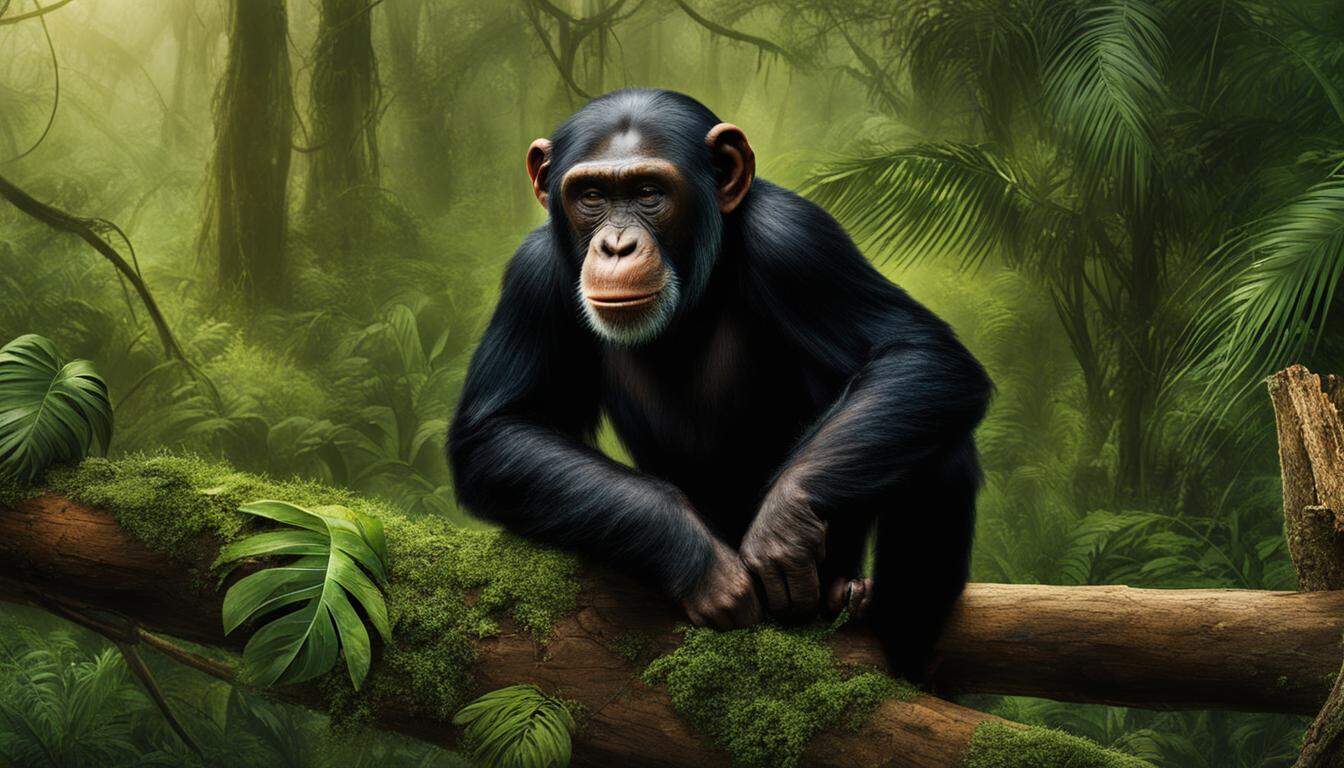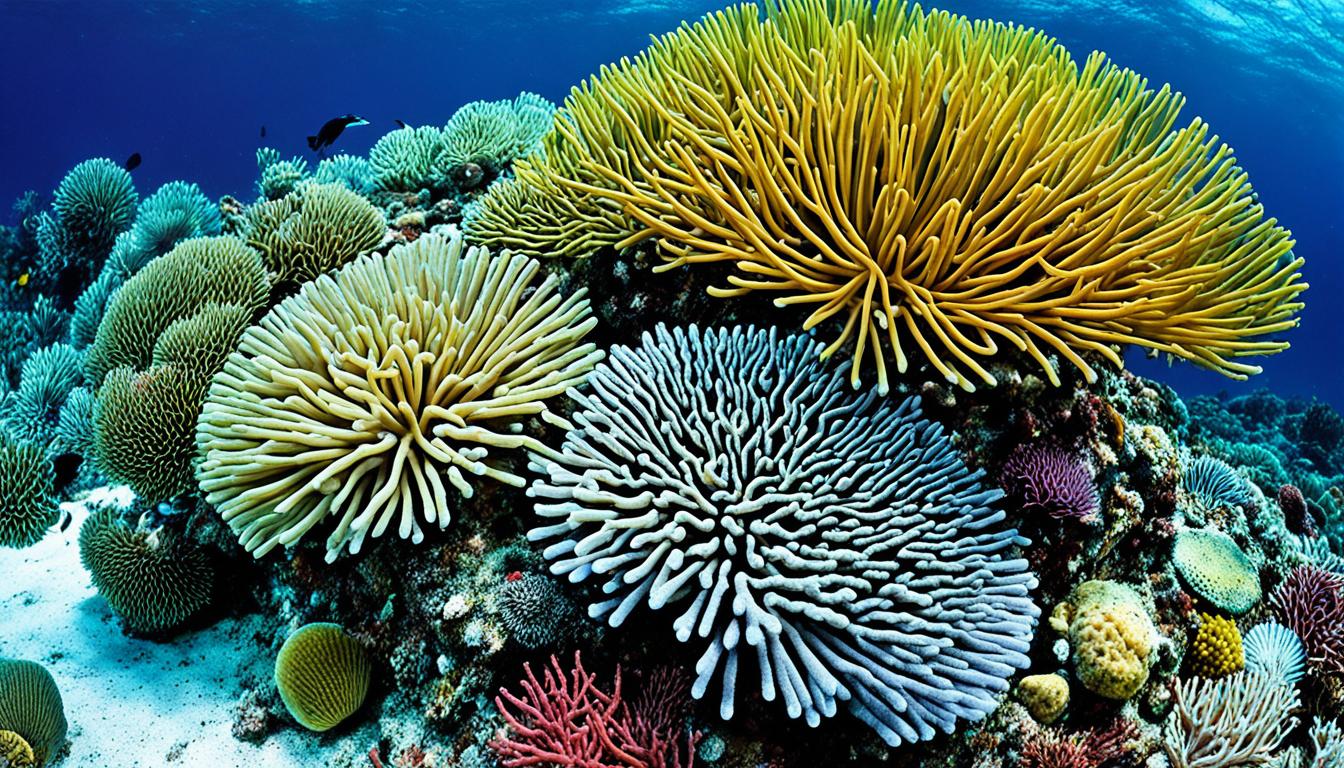Humans and chimpanzees have shared a long and complex history, dating back millions of years. Throughout time, our interactions with these incredible creatures have shaped their populations and habitats. Let’s explore the historical impact of human-chimpanzee interaction and the importance of conservation efforts to protect these endangered animals.
From ancient African cultures to European encounters in the 17th century, humans have had varying interactions with chimpanzees. Some cultures hunted them for food, while others revered them, fearing their physical resemblance to humans. These encounters sparked scientific discussions and philosophical debates about the connection between chimpanzees and humans.
In the 20th century, chimpanzees became subjects of experiments and studies, often subjected to cruelty in the pursuit of understanding human behavior. However, the groundbreaking research of Jane Goodall in the 1960s shed light on the lives of chimpanzees and the impact of humans on their habitat and populations.
Today, conservation efforts have expanded to protect wild chimpanzees, leading to legal protections and international frameworks. It is essential to recognize the historical impact humans have had on chimpanzee populations and work together to ensure their survival for future generations.
The role of chimpanzees in maintaining forest diversity
Chimpanzees, along with other great apes and elephants, play a vital role in maintaining the diversity of Central Africa’s forests. Their unique behaviors and characteristics have a direct impact on the ecosystem, contributing to the overall health and balance of these biodiverse habitats.
One crucial aspect of the chimpanzee’s role in maintaining forest diversity is their primate communication. Through vocalizations, gestures, and facial expressions, chimpanzees communicate with one another and form complex social relationships. Their communication also helps in the sharing of information about food sources, potential dangers, and territorial boundaries.
Chimpanzees have a significant effect on the ecosystem through their consumption and dispersal of large seeds. They eat a variety of fruits and nuts, many of which have hard shells or are too large for other animals to consume. By ingesting these seeds, chimpanzees help break down the hard outer covering and disperse them throughout the forest in their feces.
This seed dispersal plays a crucial role in forest regeneration and the maintenance of plant diversity. It allows for the establishment of new trees and plants in different areas, creating a more robust and resilient forest ecosystem. Without chimpanzees, these large seeds would remain intact, hindering their ability to sprout and grow.
| Chimpanzee’s Impact on Forest Diversity | |
|---|---|
| Primate Communication | Facilitates social interactions and provides vital information for survival |
| Seed Consumption | Consumes large seeds, aiding in their dispersal throughout the forest |
| Seed Dispersal | Promotes forest regeneration and the establishment of new plants |
However, the diversity of Central Africa’s forests and the crucial role of chimpanzees are currently under threat. All four subspecies of chimpanzees are endangered due to habitat loss, disease, and hunting. The slow reproductive rate of chimpanzees makes them especially vulnerable to population decrease.
Conservation efforts are essential to safeguard the future of chimpanzees and the biodiversity of Central Africa’s forests. Collaborations with NGOs, governments, and local communities are crucial in developing action plans, improving wildlife protection, and educating the public about the vulnerability of chimpanzees to hunting. By prioritizing the conservation of chimpanzees, we can ensure the continued maintenance of diverse and healthy forest ecosystems.
The impact of climate change on chimpanzees
Climate change poses significant threats to chimpanzees and their habitats. Rising temperatures and changes in rainfall patterns can alter the availability of food sources for chimpanzees, leading to decreased survival rates. Increased frequency and intensity of extreme weather events may also disrupt chimpanzee populations and their ability to adapt. The negative effects of climate change are compounded by other existing threats such as habitat loss, disease, and hunting.
Chimpanzees are highly sensitive to their environment and rely on the stability of their habitat for survival. Changes in climate can disrupt the delicate balance of their ecosystems, affecting not only the availability of food but also the overall biodiversity and ecological functions of the forests they inhabit.
“The consequences of climate change on chimpanzees cannot be underestimated. As their habitats experience significant shifts in temperature and rainfall, chimpanzees are forced to adapt or face dire consequences. Extreme weather events further exacerbate the challenges they already face, placing immense pressure on their populations.”
Conservation efforts must consider the impacts of climate change and develop strategies to mitigate its effects on chimpanzee populations. Collaborative research and data collection are essential for understanding the specific vulnerabilities of chimpanzees to climate change and informing targeted conservation initiatives. These efforts can include identifying and protecting climate-resilient habitat corridors, implementing sustainable land-use practices, and promoting awareness and action at the local, national, and international levels.
| Threats to Chimpanzee Populations | |
|---|---|
| 1 | Habitat loss due to deforestation and human encroachment |
| 2 | Hunting for bushmeat |
| 3 | Spread of diseases, including zoonotic diseases |
| 4 | Climate change and its impact on food availability and habitat |
By addressing the multidimensional threats faced by chimpanzees, including climate change, habitat loss, hunting, and disease, conservation efforts can strive to secure a sustainable future for these remarkable creatures. Protecting chimpanzees not only preserves their inherent value as intelligent, social beings, but also safeguards the delicate balance of the ecosystems they inhabit, benefiting both wildlife and human communities.
Ethical Considerations in Studying Chimpanzee-Human Interactions
Studying the intricate relationship between humans and chimpanzees raises significant ethical considerations. In particular, research on chimpanzee-human interactions and language acquisition in chimpanzees has provided valuable insights into their cognitive abilities. However, concerns have been raised regarding the treatment and welfare of the animals involved in these studies.
The historical use of chimpanzees in medical and behavioral research has highlighted the ethical challenges inherent in studying these animals. From early space research to testing in laboratories, chimpanzees have been subjected to experiments that have raised ethical questions about their treatment and the impact on their well-being.
“Our treatment of animals is important, not only for their sake but also for our own humanity. If we can’t be trusted with the animals in our care, how can we be trusted with the welfare of the wider world?” – Jane Goodall
Efforts have been made to improve the lives of captive chimpanzees in zoos and research facilities. Legal protections are in place to prevent hunting and the keeping of chimpanzees as pets. Organizations like the Jane Goodall Institute employ a community-centered conservation approach, taking into consideration the needs and realities of local communities.
The Importance of Ethical Research
While the research conducted on chimpanzees has undeniably expanded our understanding of these incredible animals, it is crucial to approach such studies ethically. By prioritizing the welfare and well-being of chimpanzees, researchers can continue to unlock valuable insights while ensuring the dignity and respect these animals deserve.
| Research Considerations | Ethical Guidelines |
|---|---|
| Language acquisition studies | Ensure appropriate living conditions and socialization |
| Behavioral observations | Minimize disruption to natural behaviors |
| Medical research | Use alternative methods when possible |
Responsible research practices require the establishment of clear ethical guidelines and oversight to safeguard the welfare of chimpanzees involved. By striking a balance between scientific progress and ethical considerations, we can continue to learn from these remarkable creatures and protect their place in the natural world.
Conclusion
Chimpanzee conservation is of utmost importance for the long-term survival of these incredible animals and the ecosystems they inhabit. With their vulnerability to population declines and their crucial role in maintaining forest diversity, it is essential that we take proactive measures to protect them.
Integrated conservation strategies that consider regional environmental, economic, and socio-economic needs are vital for the success of chimpanzee conservation efforts. By addressing the root causes of habitat loss, hunting, and disease, we can ensure the preservation of chimpanzee populations for future generations.
Public awareness and education play a significant role in supporting chimpanzee conservation. By raising awareness about the importance of protecting chimpanzees and their habitats, we can foster a sense of responsibility and inspire action. Collaboration with local communities and governments is also crucial for implementing effective conservation measures.
Organizations like the Jane Goodall Institute and international protection frameworks have made significant strides in improving the lives of captive chimpanzees and expanding conservation efforts for wild populations. However, the work is far from over. We must continue to advocate for the well-being of chimpanzees and work together to create a harmonious coexistence between humans and these magnificent creatures.
Is Human Impact on Chimpanzee Populations a Major Threat?
The human impact on chimpanzees has become a major threat to their populations. Deforestation, hunting, and the illegal pet trade have led to a sharp decline in their numbers. Without immediate action to address these issues, chimpanzees are at risk of extinction. It is crucial to prioritize their conservation and protection.
FAQ
How have humans impacted chimpanzee populations historically?
Humans have had a long relationship with chimpanzees, dating back to the time when our lineages split about 5 to 8 million years ago. Different African cultures have coexisted with chimpanzees for centuries, with interactions ranging from hunting them for food to leaving them alone out of fear and respect. Europeans first encountered chimpanzees in the 17th century, sparking scientific and philosophical discussions about the connection between chimpanzees and humans. In the 20th century, chimpanzees were used in experiments and studies, often subjected to cruelty. Jane Goodall’s research in the 1960s brought global attention to the lives of chimpanzees and the impact of humans on their habitat and populations. Conservation efforts have since expanded to protect wild chimpanzees.
What is the role of chimpanzees in maintaining forest diversity?
Chimpanzees, along with other great apes and elephants, play a vital role in maintaining the diversity of Central Africa’s forests. Their consumption and dispersal of large seeds that other animals cannot eat contribute to the ecological balance of the forests. Without chimpanzees, these forests would undergo irreversible changes.
What is the impact of climate change on chimpanzees?
Climate change poses significant threats to chimpanzees and their habitats. Rising temperatures and changes in rainfall patterns can alter the availability of food sources for chimpanzees, leading to decreased survival rates. Increased frequency and intensity of extreme weather events may also disrupt chimpanzee populations and their ability to adapt. The negative effects of climate change are compounded by other existing threats such as habitat loss, disease, and hunting.
What are the ethical considerations in studying chimpanzee-human interactions?
Studying chimpanzee-human interactions raises ethical considerations due to the close relationship between chimpanzees and humans. Language acquisition studies in chimpanzees have provided valuable insights into their cognitive abilities, but concerns have been raised regarding the treatment and welfare of the animals involved. The history of using chimpanzees in medical and behavioral research highlights the ethical challenges involved in studying these animals. Efforts have been made to improve the lives of captive chimpanzees in zoos and research facilities, with legal protections in place to prevent hunting and keeping chimpanzees as pets.
Why is chimpanzee conservation important?
Chimpanzee conservation is crucial due to their vulnerability to population decreases and the significant role they play in maintaining forest diversity. Integrated conservation strategies that address regional environmental, economic, and socio-economic needs are necessary for the long-term protection of chimpanzees and their habitats. Public awareness, education, and collaboration with local communities and governments are key to ensuring the future of chimpanzees as a species. Ongoing efforts by organizations like the Jane Goodall Institute and international protection frameworks have improved the lives of captive chimpanzees and expanded conservation efforts for wild populations.










